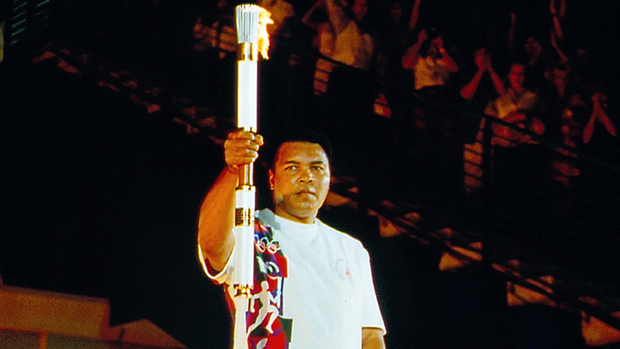
The 1996 Summer Olympics in Atlanta began with a flame lit by the legendary Muhammad Ali. Twenty years later, that spark continues to fuel growth in the city General William Tecumseh Sherman once burned to the ground.
Call it reconstruction or redevelopment: What’s transpired in the Southern capital is nothing short of remarkable. Many of the current attractions drawing millions of visitors annually did not exist two decades ago, nor did a sense that the city is on par with metropolises like New York and Los Angeles when it comes to hosting major events, sports or otherwise. Igniting it all were two weeks in 1996 when Atlanta grabbed the world’s attention.
“The Olympics were a catalyst to propel Atlanta to the next level of growth, both in tourism and in business,” says Atlanta CVB President and CEO William Pate. “It introduced Atlanta to the international stage.”
While city officials and planners took an unofficial (but deserved) victory lap marking the Olympics’ 20th anniversary in July, one could also not help but get a sense a chapter was closing on the city’s history. Between Ali’s passing in June and the Braves’ impending move from Turner Field, the symbolism has been hard to miss.
But like the phoenix emerging from the ashes, Atlanta is about to undergo another transformation—made possible by the success of the Olympics, yet moving farther away from that moment in time.
Once in a Lifetime
Charlie Battle, an attorney at Miller & Martin PLLC, who was a member of Atlanta’s Olympic bid committee, remembers being approached about Atlanta making a run at hosting the games in the late 1970s.
While the city boasted a major international travel hub in Hartsfield-Jackson International Airport and thousands of hotel rooms, Battle didn’t think the timing was right.
“For one thing, it was coming right after the 1976 Olympics in Montreal, which nearly bankrupted that city,” says Battle. “But I thought, maybe in my lifetime.” Years later, Augusta National Golf Club Chairman William Porter "Billy" Payne’s dream to win the Olympics still seemed like a peach pie in the sky when he first suggested it. After all, the Olympics were surely headed back to where they began to celebrate their centennial.
But Athens’ bid fell apart—only to be salvaged for the 2004 games—and Toronto’s effort may have peaked too soon. In a case of timing being everything, Atlanta scored the rare feat of winning the Olympics on its first try.
Built to Last
In the heart of Atlanta, where interstates 20, 75 and 85 meet, the Olympic cauldron today remains as visible as the sign for The Varsity, the world’s largest drive-thru restaurant (a city icon in its own right). The fact that Turner Field, which hosted the 1996 opening and closing ceremonies, as well as track and field, has remained home to a professional sports team for 20 years makes it an anomaly.
A 2014 study rated the former Olympic stadium as the most effective venue ever built for an international sporting event. In general, Atlanta has gotten more use out of its Olympic venues than most other host cities. That lack of white elephants—the term describing empty, unused facilities—is a source of pride among city and event planners.
“I think Atlanta did that better than any city in recent history,” says Pate. Only the shuttered tennis center in Stone Mountain, where Andre Agassi won gold, has proven a dud. Major successes include Georgia Tech taking over the aquatics center, which hosted Olympic training camp this year after USA Swimming moved the event from Puerto Rico over concerns of the Zika virus. Lake Lanier Olympic Park has maintained its legacy as an active rowing site, and is set to undergo a $10 million renovation before hosting the 2018 Dragon Boat World Championships.
Beyond sports facilities, consider the city’s openings since the Olympics: Georgia Aquarium in 2005, the new World of Coca-Cola in 2007, and both the College Football Hall of Fame and National Center for Civil and Human Rights in 2014.
“You can attribute almost all of that to the Olympics in some way,” says Pate, an Atlanta native who was chief marketing officer of BellSouth during the Olympics. And that’s to say nothing of Centennial Olympic Park, an unofficial annex for ancillary events capitalizing on fans who want to experience the grand stage of, say, a Final Four game but don’t have a ticket. During the 2013 Final Four, the park hosted concerts over three nights with 100,000 people in attendance for each show. Add it all up, says Pate, and you’ll see why Atlanta is in the top four in convention business and leisure travel in the country.
What Comes Up…
Winning the Olympics proved beneficial for Atlanta prior to the games too, with the Super Bowl coming to town in 1994. The post-Olympic bounce netted a return in 2000.
Today, sporting events are responsible for 5 to 6 percent of Atlanta’s tourism business, estimates Pate. As a bonus, many top events occur on weekends where hotel occupancy might otherwise be low. Case in point: This year’s Chick-fil-A Peach Bowl, doubling as a college football semifinal game, will be played on New Year’s Eve at the Georgia Dome.
Business should only continue to boom with further developments. The Georgia Dome is coming down and Turner Field is about to become repurposed, but what’s coming promises to be bigger and better.
Mercedes-Benz Stadium, soon to be the new home of the Atlanta Falcons, is already earning dividends a year before its completion. The NFL awarded the stadium Super Bowl LIII in 2019, completing an impressive trifecta that includes the 2018 College Football Playoff National Championship and 2020 NCAA Men’s Final Four. Also, the SEC signed a new 10-year agreement in 2015 to keep its football championship in Atlanta.
Meanwhile, the Braves are slated to move to SunTrust Park in Cobb County in 2017. Turner Field, which reshaped Atlanta before, will once again be at the center of a renaissance. Georgia State University is slated to acquire the land for a $300 million mixed-use development including an on-campus football stadium. Other sports are getting in on the action.
Major League Lacrosse expanded to Atlanta this year with the formation of the Atlanta Blaze, which play at Kennesaw State University’s Fifth Third Bank Stadium. The Georgia Swarm, a professional indoor lacrosse team, moved to Infinite Energy Arena in Gwinnett County in 2015.
Next year, Atlanta United FC, the newest Major League Soccer team, will kick off its inaugural season at Mercedes-Benz Stadium New events lead to new development. A Hard Rock Hotel will open near Mercedes-Benz Stadium, and the Georgia World Congress Center Authority is seeking to build an 800-room hotel that would attract attendees of events at the convention center, football stadium and Philips Arena, where the NBA’s Hawks and WNBA’s Dream play. Once everything is completed, Atlanta will hardly resemble its past self, again.
Return Trip? No Thanks
Pate says Atlanta will never fully separate itself from the Olympics, nor should it try. Beyond tourism, international companies first introduced to Atlanta now have offices there.
Clearly the economic benefit to the city was substantial,” he says. “It’s a very compelling marketing opportunity.”
The world’s busiest airport continues to capitalize on exposure, as evidenced by plans for a 20-year expansion project. More than 25 percent of conference attendees coming to Atlanta are from outside the United States, according to Pate. That’s the financial side. Then there is the sense of civic pride hosting an Olympics produces.
“It’s wonderful to have something everybody can get behind,” says Battle. So wonderful that there should be a sequel? “No,” Battle says emphatically.
Pate agrees the 1996 games served their purpose and there’s no desire to bring them back. “The first time you host [the games], there are a lot of things that come with it,” he says. “You’re introducing yourself to the world. You’re only going to get that opportunity once.”
Top 5 Moments From the 1996 Games
The Olympics always generate iconic moments in a city. Here’s what anyone in Atlanta will remember:
1. During an emotional ceremony at a men’s baseball game, Muhammad Ali received a replacement gold medal for the one he lost.
2. Gymnast Kerri Strug stuck the landing on her vault despite a serious ankle injury.
3. Wearing gold shoes, Michael Johnson became the first runner to win the 400-meter and 200-meter races.
4. The U.S. won gold in women’s soccer, the first year it was an Olympic event.
5. Future WWE star Kurt Angle won gold in wrestling.
Parks vs. Rec
SunTrust Park, the Braves’ new stadium, is an example of how one facility that may benefit a larger community may have adverse effects on grassroots events. One immediate side effect of the project is Cobb County can’t afford to spend $40 million (allocated back in 2008) on new public parks where youth events would likely be held. The Atlanta Journal-Constitution reports only $20 million is available after funds were redirected toward the stadium. The Great Recession initially stalled the funding, The AJC adds.








